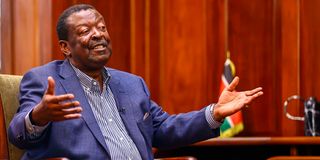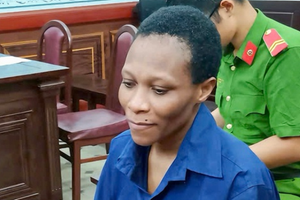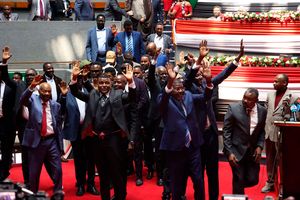
Prime Cabinet Secretary and Cabinet Secretary for Foreign and Diaspora Affairs Musalia Mudavadi during an interview at his office at Kenya Railways Headquarters Nairobi, Nairobi on January 18, 2025.
Kenya’s Prime Cabinet Secretary Musalia Mudavadi says Kenya is cultivating a game of maximum awareness on the international scene, seeking to protect its identity as well as that of Africa in a changing world.
In a lecture delivered in Budapest, Hungary, this week, Mudavadi, also the Cabinet Secretary for Foreign and Diaspora Affairs says Nairobi has adjusted to the fact that the world is now multipolar, not bipolar as before when the US and Russia (Soviet Union) competed for global supremacy.
While at it, he argued Kenya will not interfere in any country’s internal affairs, subtly swatting away recent criticism Nairobi was doing just that in Sudan and the Democratic Republic of Congo.
“Kenya is guided by our Foreign Policy principles of non-interference, ensuring peaceful coexistence and promoting resolution of conflicts by peaceful means,” he told an audience at the Hungarian Diplomatic Academy on Wednesday, where he presented Kenya’s perspective on the evolving geopolitical landscape both regionally and globally.
Three issues emerged; one was on Kenya’s actual position on the conflict in Gaza. Others were about the war in Sudan and the conflict in the Democratic Republic of Congo.
“Kenya espouses the achievement of a two-state solution founded on relevant UN resolutions and African Union position on the Israel-Palestine conflict,” Mudavadi added.
“Having been a victim of terrorism, Kenya abhors the use of terror and other forms of violence that harm innocent civilians.”
He was repeating Kenya’s recent stance: one which avoids sensibilities.
On the Russia-Ukraine conflict, he said Kenya called for a speedy and peaceful resolution. In the past, Kenya condemned Russia’s invasion. But it has since cooled the language, calling on sides to seek peaceful solutions while at times abstaining on UN General Assembly votes seeking to reprimand Russia.
“Similarly, Kenya continues to actively engage in mediation and peace initiatives both regionally and internationally, including in DRC, Sudan, Somalia, South Sudan, and Haiti among others because we recognise that sustainable peace in one part of the world contributes to the shared prosperity globally,” he said.
In both countries, Nairobi recently came under fire: In Sudan, the military junta protested hosting Rapid Support Forces and allied groups in Nairobi where they launched a charter. Sudan has since reacted by blocking Kenyan tea and other goods. In the DRC, Kenya ran into similar trouble after hosting M23 rebels where they created the Alliance Fleuve Congo which they said they would use to topple the government in Kinshasa.
Kenya, however, argues it was still on the old principles it was known for in the region. But Mudavadi admitted the global landscape is undergoing a significant transformation, marked by the evolution of the post-Cold War international order as new alliances form and fresh rivalries take shape.
The overall impact, he argued, is that global powers are entangled in hypocrisy, deceit, unilateral actions, and militarism, which erode the foundations of global governance and the established principles of international relations. These principles include sovereignty, human rights, democracy, collective action, human solidarity, shared prosperity, and a rules-based international order rooted in multilateralism.
“The evolving global scenario poses a challenge for Africa and Kenya, as it appears to conflict with the African philosophy of diplomacy,” he stated.
“There is a shifting world order where even liberal states desire to insulate themselves against globalisation by adopting hyper-nationalism and isolationism and prioritising individualistic state-centric security and defence approaches over collective security, thus reviving the post-World War II security dilemma including nuclear weapons threats and proliferation.”
Mr Mudavadi noted that the traditional unipolar and bipolar systems of the past have faded, making way for a new world order, driven by emerging powers, new global actors, changing interests, and the growing assertiveness of developing nations, all of which are reshaping the global balance of power.
For Kenya, those interests have now included digital resources, and blue economy protection of the environment, beyond the usual territorial integrity and political stability.
Some things though have remained. Kenya says it is advancing economic diplomacy. In Hungary, Budapest offered 200 scholarships to Kenyans every year, reflecting the continuity of the use of soft power to sustain ties.
“I appreciate the Hungarian government for the 200 scholarships offered annually to Kenyan students through the Stipendium Hungaricum Programme. These scholarships have driven significant transformation across various sectors in our economies,” Mr Mudavadi said after signing the agreements with Hungary’s Foreign Minister Péter Szijjártó.
There are common problems though. Mr Mudavadi pointed out that modern conflicts are marked by indiscriminate attacks on civilians, including schools and hospitals, the use of sexual and gender-based violence as a weapon of war, the destruction of livelihoods, and mass displacement.
The United Nations High Commissioner for Refugees, for example, says some 139 million people could be displaced globally this year, largely due to conflicts. Some 30 million of those will be in the Horn of Africa.






